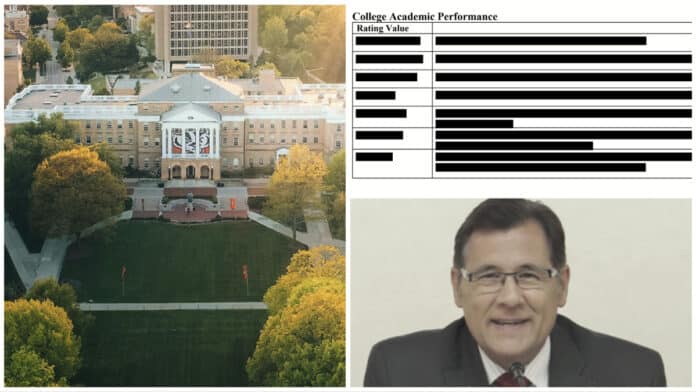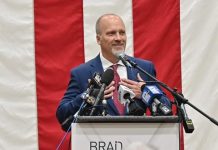UW-Madison blacked out lengthy sections of its admissions criteria in response to an open records request from a Republican legislator who is now trying to change state law to mandate that the flagship university admit Wisconsin students in the top 5% of their classes.
UW-Madison’s freshman class was 8,628 students back in September of last year. The UW’s own numbers show that about 45% of that class is from Wisconsin; the rest are from other states or other countries. Sixty percent of Wisconsin freshman applicants who applied to UW-Madison last fall were accepted.
On Thursday, in the wake of the United States Supreme Court decision striking down affirmative action in university admissions at two prominent schools, Wisconsin Right Now obtained the blacked-out documents that were sent to state Rep. David Murphy in September 2021. In the wake of the Court decision, UW-Madison admitted, “We have considered the race of applicants as one factor in a holistic admissions process that focuses first and foremost on candidates’ academic strength.”
UW-Madison told Murphy it redacted the documents to protect “trade secrets” and because “release of such information would harm the public’s interest.” The university was also concerned that employees could face “reprisal” if their names were released.
READ THE REDACTED DOCUMENTS HERE:
Undergraduate Admissions Holistic Review – Additional Training 2021-2022 DRAFT_Redacted[89]
Letter to Rep. Murphy re Records Request 2021.09.17[17]-1
Transfer Applicant Evaluation Page 2021-2022 FINAL (002)_Redacted[6]
Undergraduate Admissions Holistic Review – Principles 2021-2022 FINAL (002)_Redacted[71]
Undergraduate Admissions Holistic Review – Guidelines 2021-2022 FINAL_Redacted[14]
The group of Republican lawmakers, including Murphy, on Wednesday, introduced legislation that would guarantee a seat at UW-Madison for any Wisconsin high schooler who graduates in the top 5% of their class.
The action also came after Wisconsin Right Now published a series of stories from family members who were upset that high-achieving Wisconsin students were being turned away by UW-Madison.
“With the amount of money that we as taxpayers [pay] for K-12 and University of Wisconsin System, is it too much to say ‘We want that top 5%?’” Rep. Jerry O’Connor, R-Fond du Lac, asked reporters on Wednesday.
O’Connor said the numbers leave Wisconsin kids left out.
“[There] seems to be an institutionalized brain drain, sending some of our best people to other states,” O’Connor said. “And guess what happens when they graduate from the University of Minnesota, or Iowa, or Indiana? They make that their home. They don’t come back.”
But legislators have had trouble getting information about how UW-Madison decides which students to admit.
Murphy, R-Greenville, said getting any answers about UW-Madison’s admissions is a part of the problem.
“As chairman of the Colleges and Universities Committee, my office asked for UW-Madison’s admissions policy. We got a more than 50-page document that is about 90% redacted,” Murphy added.
Specifically, when it came to the open records request, UW-Madison claimed that releasing the redacted information would “undermine the significant public interest in maintaining the competitive position of UW-Madison – vis-à-vis its peer institutions – when recruiting and evaluating students.”
It would also “have a deleterious effect on the puplic’s interest in maintaining a fair and equitable application review process,” the university wrote.
The letter continues that releasing the information “would likely have the effect of harming those applicants who did not or could not access such information, which would place those applicants at a significant disadvantage when applying to UW-Madison.”
The university added, “Information contained in these documents can directly or indirectly identify UW-Madison employees who review admissions applications. Due to the highly competitive nature of college admissions, UW-Madison has redacted any information that may directly or indirectly identify these employees in order to protect them from potential reprisal by applicants who are not granted admission to the university.”
The letter was signed by Nancy K. Lynch, the vice chancellor for Legal Affairs.
One partially redacted document was called Undergraduate Admissions Holistic Review: Principles for the 2021-22 enrolling class and was stamped “for internal use only.”
The document says UW-Madison uses a “holistic, competitive and selective admissions review process that aligns with our mission. Our goal is to recruit, admit and enroll a high quality and diverse incoming class.”
The academic record comes first, but UW-Madison also considers written essays, extracurricular activities, leadership involvement, letters of recommendation and standardized test scores when required or provided, the document says.
“Our primary commitment is to residents of Wisconsin. We seek students who will add unique perspectives to the educational environment of UW-Madison, including members of historically underrepresented ethnic and racial groups those from rural Wisconsin farm backgrounds, first-generation college students, veterans and those currently serving our country in the armed forces, women interested in STEM majors and international students,” the policy says, adding that UW-Madison was also looking for students with “special talent in music, dance, art design, athletics or other areas of institutional need.”
Generally students who earn As and Bs in rigorous courses are considered competitive, and class rank is also considered, the policy said.
Under college record, a passage was blacked out. Sections under essays were blacked out, including common app essay prompts. Students may be required to submit a standardized test score to demonstrate English proficiency, the policy says.
Sections under non-cognitive competencies were also blacked out.
The policy discussed “higher predictors of success in college for non-traditional students than either GPAS or SAT-ACT scores.” But what those are was blacked out.
The university lists diversity as a consideration and says that Madison desires “to enroll more students from a variety of cultures from across the US and around the world. We also seek to enroll students who identify with race and ethnicities who are underrepresented in the population of the State of Wisconsin,” listing African-American, Hispanic, American Indian, Southeast Asian. Madison strives to enroll students “from every county in the state of Wisconsin, all 50 states and a range of countries worldwide.”
Whole sections under the admissions policy for transfer students and new freshmen were blacked out, including rating value for college academic rigor, indicators of college-ready writing, and the rating value given to positive campus contributions.
Wisconsin students “who have good grades and are taking competitive course work based on what’s available to them at their high school are likely to be admissible,” the policy says.
Rewriting the Admission Formula
O’Connor’s plan would require the UW System to rewrite its admissions formula and share with schools, parents, and teachers more of what it takes for students to get into UW-Madison.
The UW has said it shares the lawmakers’ goal of keeping Wisconsin’s “best and brightest” in the state and at a UW school. But the university didn’t specifically comment on the requirement that the Republicans are pursuing.
O’Connor said he hasn’t spoken to the university about the requirement but did say “this issue has been brought up to the university previously, and they’ve made no changes.”
There are fewer than 70,000 high school graduates in Wisconsin each year. Five percent of that comes to about 3,500 kids. UW-Madison accepts about 3,600 Wisconsin students each year.
“So the idea that we are going to push somebody else out, I don’t buy that,” Murphy said.
Any changes to UW admissions will come later, however. Lawmakers in Madison are due to wrap up their session for this year by the end of the week.
Table of Contents




![WATCH: Elon Musk Town Hall Rally in Green Bay [FULL Video]](https://www.wisconsinrightnow.com/wp-content/uploads/2022/04/Elon_Musk_3018710552-218x150.jpg)



![The Great American Company [Up Against the Wall]](https://www.wisconsinrightnow.com/wp-content/uploads/2025/03/MixCollage-29-Mar-2025-09-08-PM-4504-218x150.jpg)
![The Wisconsin DOJ’s ‘Unlawful’ Lawman [WRN Voices] josh kaul](https://www.wisconsinrightnow.com/wp-content/uploads/2025/03/MixCollage-29-Mar-2025-08-48-PM-2468-218x150.jpg)



![Judges vs. Trump [Up Against the Wall] Frederick Walls Trump Holds Cash Special Counsel Jack Smith Iowa Victory for Trump Remove Trump From Primary Ballot](https://www.wisconsinrightnow.com/wp-content/uploads/2023/11/trump-case-dismissed-218x150.jpg)
![The Fed Reverses Course [Up Against the Wall] the fed](https://www.wisconsinrightnow.com/wp-content/uploads/2023/07/Collage-Maker-20-Jul-2023-08-12-AM-729-218x150.jpg)




![Phil Gramm’s Letter to Wall Street Journal [Up Against the Wall]](https://www.wisconsinrightnow.com/wp-content/uploads/2025/03/gramm-218x150.png)



